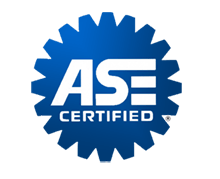BOULDER TOYOTA GUIDE: REPAIR & MECHANICS
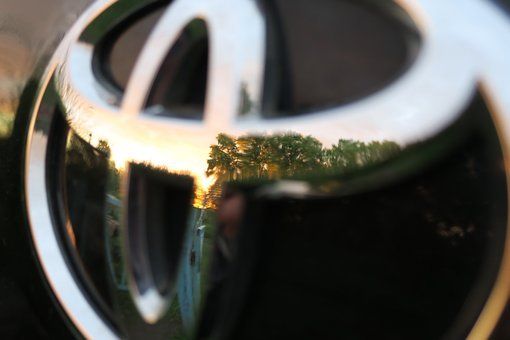
As auto mechanics with over 30 years of combined experience, we know there’s no replacement for having a reliable, affordable car you love to drive.
We work on Toyotas more than nearly any other brand. We’ve seen just how sturdy these vehicles are, and just what they need to keep running smoothly year after year.
With the right knowledge, you can save thousands of dollars in auto repairs every year and get more back from your Toyota when you’re ready to upgrade to a newer model. In this guide, we cover common repairs, seasonal repairs, upgrades, and buying and selling a Toyota.
PAGE NAVIGATION:
Let’s start out with a look at what every Toyota owner needs: a knowledgeable and reliable mechanic.
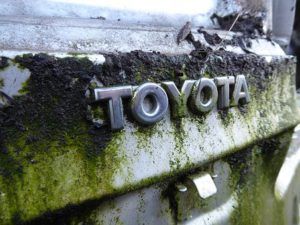
FINDING THE RIGHT TOYOTA MECHANIC
Whether you’ve never looked under a car’s hood or you’re a whiz at automotive repairs, you never know when you’ll run into an issue that requires a professional. Bringing your car to a qualified Toyota mechanic can save you time and hassle, especially if you don’t have access to specialized parts.
First and foremost, you’ll want to work with an auto shop that offers fair prices and extensive experience with Toyotas in particular. Here are some other key things to look out for while selecting the right mechanic:
- Automotive Service Excellence certification
- Toyota expertise
- Honors your Toyota warranty
- Thorough understanding of generalized and specialized auto repair
- The most current information about all things Toyota, including models, parts, recalls, and diagnostics
- Official Toyota parts, whether new or recycled
- Ongoing commitment to customer satisfaction and top-notch service
- Skilled, reliable, and trustworthy mechanics who actually drive Toyotas
Once you have a mechanic you trust, you have someone you can go to for emergency and seasonal repairs knowing you’ll get a fair estimate. You can also make long-standing repairs and upgrades you’ve been meaning to, make more if you decide to sell, or more easily buy a secondary or replacement vehicle.
Let’s take a look at some of the common reasons Toyota drivers might make a visit to their preferred auto repair shops.
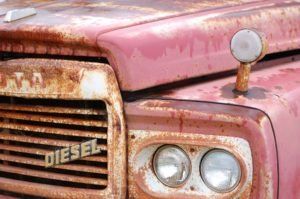
COMMON TOYOTA ISSUES
Toyotas are high-quality cars that, when properly cared for, rarely break down, even after years on the road. In fact, “about 80 percent of all Toyota vehicles sold over the past 20 years are still on the road today.”
Still, every car has its quirks, and it’s important to know what you may come across when driving or buying an older or heavily used Toyota.
So, before we get into repairs, here are a few of the more commonly seen issues seen in different models.
A few of the most prevalent Toyota issues include transmission and engine problems. Specifically, “an increasing number of Toyotas are experiencing excessive oil consumption”—the Camry in particular.
On the 1996-2002 4Runners and Tacomas, it’s common for the rear axle seals to leak gear oil. Most of these models will need leak repairs at some point or another, and you should make sure to clean out your differential breather. They may also develop steering issues that require a new steering rack. And, Tacomas have had issues with sticky accelerators, peeling paint, and spotty radios.
The Prius, which is a popular model in Boulder, Denver, and surrounding areas, has a history of headlight issues, as well as some potential engine issues. Because the Prius has a unique hybrid engine, engine problems can also require specialized repairs.
When buying used, it’s also important to look out for rust. Toyota trucks in particular have had issues with the frame rails rusting out. If you’re buying a used Toyota truck—especially in an area that goes through wet winters, it’s essential to thoroughly inspect for rust.
Even if you don’t encounter any of these issues, it’s important to take care of your vehicle with regular repairs.
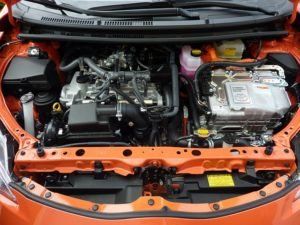
COMMON TOYOTA REPAIRS
By bringing your Toyota in for tune-ups and making regular repairs, you can keep your car operating to its fullest potential for years.
REGULAR OIL CHANGES KEEP YOUR ENGINE PURRING
First and foremost, check your owner manual to determine which kind of oil best suits your car.
Some Toyotas call for 5w-20 or 5w-30 mineral oil, but can also take 0w-20 synthetic oil. Regardless of the type of oil you use, these vehicles require 5,000 mile/6-month oil changes.
Other Toyota vehicles require the use of 0w-20 synthetic oil. According to the official Toyota website, most of these vehicles “have been approved for extended oil change intervals of 10,000-miles/12-months.” This does not include Toyotas with 3UR-FBE Engines (e.g., the Flex Fuel Tundra/Sequoia).
But, there’s a catch.
Remember, excessive oil consumption (and leaking valve cover gaskets) can be an issue with Toyotas, and you don’t want to burn through your oil without realizing it. Even if your vehicle has been approved for the extended oil change, Toyota strongly recommends that you keep a sharp eye on your oil level and top off as needed.
And, if you often find yourself driving in “Special Operating Conditions”—“driving off-road, on dirt roads, towing a trailer, making repeated short trips under 32˚ F, or extensive idling”—you need to replace your oil at least every 5,000 miles, even if you use synthetic.
Overall, we recommend changing your oil every 3,000 miles (or about 3 months). If you burn through your oil, you could find yourself in for a much more expensive engine repair.
REFRESHING FLUIDS PREVENTS LONG-TERM DAMAGE AND COSTLY REPAIRS
Along with oil, your Toyota needs a number of other important fluids to ensure it operates smoothly. You should keep an eye on:
- Antifreeze/Coolant
- Brake fluid (check every 5,000 miles!)
- Gear oil (grime build-up inside the rear wheels may signal a leak)
- Windshield wiper fluid
Consult your Toyota maintenance guide to see recommendations for how often to check fluids in your specific model. The guide will also tell you how to best remedy low fluid levels.
If any fluids seem to be running out faster than you can fill them, you may have a leak or another issue that requires professional service. Don’t let a leak go unchecked!
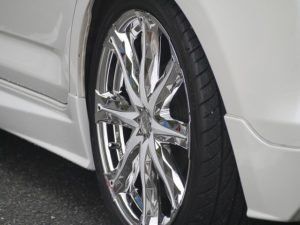
MAINTAIN YOUR TIRES TO IMPROVE HANDLING
Flat tires are common in every make and model, and Toyotas are no exception. But, fixing a flat isn’t the only tire maintenance your Toyota needs to keep you safely headed in the right direction.
Toyota recommends that you have tires rotated and inflated every 5,000 miles. We recommended checking treads and air pressure at least once a month. Inflate your tires as needed, especially during the winter months, when cold air can deflate tires.
If you can suddenly hear the road beneath your tire more clearly, or if you notice you have less control turning or staying straight in your lane, bring your vehicle to a repair shop to have your tires inspected and rotated. Irregular wear could mean one or more tires needs to be replaced.
ENGINE REPAIRS CAN PREVENT A SUDDEN BREAKDOWN
In Toyotas (especially Camrys) with high mileage, there’s a chance one or more motor mounts could wear out, leaving you stranded with a big repair bill.
The Prius has a specialized hybrid engine that uses both a gasoline engine and an electric motor, which is fed by the battery. While this system keeps gas mileage down, it also means that any engine issues require the attention of a qualified Toyota mechanic.
It’s also common for some Toyotas to develop valve cover gasket leaks, especially near the firewall. If you smell the odor of something burning coming through your vents, you may have a leak.
A burning smell is always a sign to visit an auto shop. And, whenever you see the “Check Engine” light, it’s time to come in for an inspection!
TIMING BELTS
Your vehicle’s timing belt makes sure the engine valves open and close at the proper intervals, which is essential to smooth operation.
Timing belts used to need replacement at 60,000 miles but can now last up to 120,000 miles in many models. Still, a broken timing belt can cause immense damage to your engine and even destroy it.
Plan ahead and schedule a timing belt replacement when you start approaching the 100,000-mile mark. This can also be a good time to inspect and replace other engine components to keep your engine is in good repair for years to come.
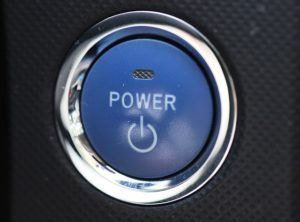
BATTERY MAINTENANCE KEEPS YOUR CAR READY WHEN YOU NEED IT
Vehicle batteries generally need replacing every 4-6 years, though some estimates say that you could benefit from a new battery as soon as 36-months after installation.
The most obvious sign that your battery has a problem is that your car simply fails to start, leaving you stranded wherever you last parked. That might be okay in your personal garage, but it can be pretty aggravating if you’re stuck at a parking meter or in a hiking trail parking lot.
Batteries can also be damaged if they aren’t properly secured, cleaned, and maintained. A mechanic can run diagnostics to make sure your battery is powerful enough to get you wherever you need to go.
PROTECT YOUR ENGINE WITH REGULAR AIR FILTER REPLACEMENTS
That’s right. Your air filters do more than keep your car’s interior feeling and smelling fresh. Toyota air filters “prevent abrasive material from entering along with the oxygen the engine needs.”
When the air filters are clogged, oxygen can no longer travel to the engine, leading to sputtering, stalling, and overall poor engine performance. Regularly checking and changing the air filter allows your engine to breath easy.
THE RIGHT KIND OF GASOLINE CAN IMPROVE MILEAGE
Check your vehicle’s maintenance manual to ensure that you’re using the recommended grade of gasoline. Using the wrong grade can increase your mileage and even cause long-term damage on your engine.
And, of course, don’t let you car run on empty!
LIGHTS AND WIPER REPLACEMENTS ENSURE BETTER VISIBILITY
Your lights are the key to staying safe at night and alerting everyone else to your presence on the road. If one of your lights is going dim, be sure to get it checked out and replaced.
Because it’s common for some Prius models (years 2006 to 2009) to have sudden issues with headlights, it can be smart to get those checked out before you find yourself without headlights when you most need them.
You might also need to replace your windshield wipers, especially after periods of rough weather. Keep an eye on your front and back wipers to keep yourself from ever driving blind.
BRAKE REPAIRS KEEP YOU AND YOUR PASSENGERS SAFE
If you hear clicking, grinding, or squealing, or if your car seems like it’s shaking when you go to brake, your brakes are likely in need of repair.
It may be that your brake pads have worn out, leading metal to grind again metal. Or, the brakes themselves might be warped.
Replacing your brake pads and rotors is key to ensuring you can stop when you need to.

SEASONAL REPAIRS
In addition to general maintenance and repairs, there are a few things you should do to keep your Toyota on the road all year long.
SPRING
Winters in Colorado don’t hold back, and snowstorms can extend far into the spring months. That means keeping your car prepared for slush one day and a heat wave the next, with all sorts of rain and wet in between.
- Check tires for low air pressure and wear and tear on the treads. Cold air, salt, and ice can all take a toll!
- Check windshield wipers, especially if they’ve been frozen.
- Consider buying foggers to prevent steaming up the windows as temperatures fluctuate.
- Clean your car thoroughly to get rid of any mud buildup, especially if you drive on unpaved roads.
SUMMER
From dry heat to sudden thunderstorms, Colorado summers are known for their changeable weather. Make sure your Toyota can adapt to everything under the sun.
- If it’s been dry for a while, that first rain shower will make the roads especially slippery. Check tire tread to make sure you’ll be able to grip the road.
- Tires can blow out in extremely hot weather. Check to make sure your tires are in good condition and keep patches and spares handy.
- Check air conditioning and air filters.
- Keep tabs on dust and debris build-up, including bugs on the windshield.
- Consider cooling down the interior with window tint or sun strips.
- Invest in driving gloves to protect your hands from hot steering wheels.
- Assess your car before and after long summer road trips. Keep an eye on mileage and remember routine maintenance.
- If you’re planning any long road trips, create an emergency kit in case of sudden breakdowns. Consider anything you might need if you’re stranded in on a hot highway with no air conditioning—water bottles, battery-powered fans, a battery-powered phone charger, sunblock, sun hats, window shades, and nonperishable foods won’t take up too much room, but can save your life in an emergency.
Keep Your Toyota On the Road All Year Long with Seasonal Repairs
FALL
The changing leaves signal ongoing rain and oncoming frost and snow. Prepare for icy roads, gray skis, and sudden flurries.
- Keep your car free of leaves and mud.
- Check your tires, especially if you spent the summer road-tripping, and keep an eye on tire pressure.
- Check your fluid levels, especially if you’ve increased your car’s mileage.
- Make sure your heater and defroster are working to avoid unpleasant surprises on that first chilly day.
- Check your wipers and keep an ice scraper in the glove box.
WINTER
Whether you’re driving in the city or the mountains, Colorado winters can mean traversing ice, salt, snow banks, pitch-black roads, and traffic jams.
But with work, school, and other responsibilities, sometimes staying indoors just isn’t an option.
There are steps you can take to make your Toyota winter-ready. Even if you already started the winterizing process in the fall, make sure you’re prepared for even harsher conditions.
- Check your defroster.
- Check your heater.
- Raise your windshield wipers when you expect snow and ice.
- Avoid spraying windshield wiper fluid on icy windshields. It can freeze and make it impossible to see!
- Keep a windshield scraper in your car.
- Remember to leave time to let your battery warm up on especially cold days. This makes scraping ice easier too.
- Get chains and prepare to use them when road conditions require.
- Thump on your hood before driving to scare away any small animals that may have crawled inside for warmth.
- Create a snow emergency kit, complete with battery-power cell phone chargers, battery-powered flashlights, blankets (regular and emergency), gloves, socks, warm clothing, hand warmers, water bottles, and nonperishable foods. You might also want to include a shovel in case you ever need to dig yourself out of a snow bank.
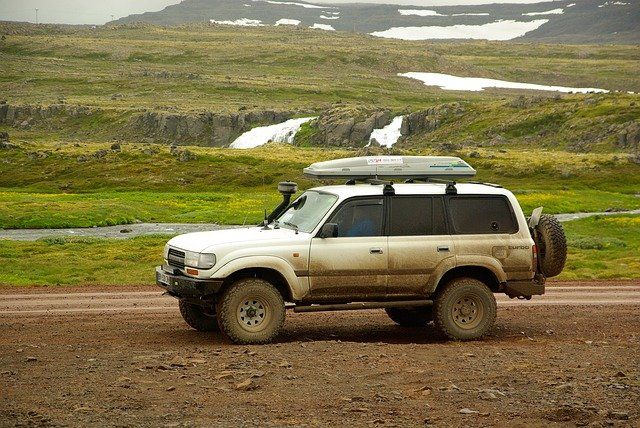
TOYOTA UPGRADES TO SAVE MONEY AND EXTEND YOUR CAR’S LIFE
You can modify your Toyota to better fit your automotive needs and make upgrades that improve its functioning and value over the long-term.
SUSPENSION LIFT KITS, LARGER BUMPERS, AND LARGER WHEELS FOR OFF-ROADING
With the help of a Toyota mechanic, you can turn your 4Runner or Tacoma into a durable off-roading vehicle. Raise the suspension and size-up your tires so you don’t scrape against boulders. Then, opt for larger bumpers that can protect against even the wildest terrain.
A NEW AIR INTAKE SYSTEM TO MAXIMIZE HORSEPOWER
Your Toyota’s factory intake feeds hot air into the engine. With an upgrade, you can make sure that your vehicle only sucks in cold air, giving the combustion the boost needed to amplify torque and horsepower.
Even better: According to AutoAnything, “Powerful combustion results in better fuel economy,” which can save you dollars down the line.
EXHAUST UPGRADES TO INCREASE FUEL ECONOMY
A new exhaust, muffler, and/or tips can improve fuel economy and enhance your Toyota’s overall power and performance. You can also enjoy a little more rumble and roar with your drive, especially in a large truck like the Tundra.
THROTTLE BODY SPACER FOR MORE POWERFUL ACCELERATION
Body spacers make for a better fuel/air ratio in your Toyota’s engine, giving your ride more power for less gas (meaning less time and money spent at the fuel pump). With improved gas mileage and top-notch engine performance, your Toyota can become an even more reliable machine.
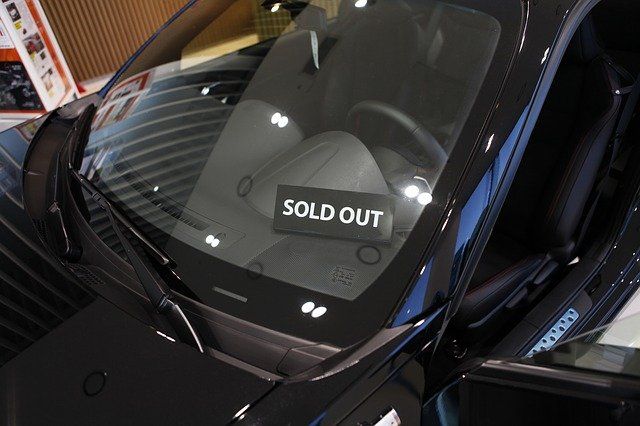
SHOULD YOU BUY A NEW OR USED TOYOTA?
Toyotas aren’t the cheapest vehicles on the market. But they are high-quality cars from the inside out, which means they retain their value and offer a great return on your initial investment, whether you’re buying new or used.
BUYING A NEW TOYOTA
When buying any new vehicle, keep in mind the size and features you need.
Most new Toyotas are up-to-date with Bluetooth entertainment systems, and Toyota Safety Sense comes standard on many vehicles.
You should also consider whether or not you want a vehicle with a hybrid engine, which can save money on gas while protecting the environment. Toyota hybrids come in a range of sizes, from the Prius c to the Highlander. Keep in mind that hybrid engines generally need specialized repairs from Toyota experts.
There are many Toyota dealerships in the Boulder/Denver area, including:
BUYING A USED TOYOTA
Because Toyotas hold their value so well, when buying used, you can rest easy knowing that you can make most of your money back if you decide to sell. You can also save money on insurance and trust that even a used Toyota is likely to have a long lifespan.
Still, it’s always wise to do your research. By knowing how much a car is worth before you even walk on the lot, you can better protect your wallet.
Kelley Blue Book can give you fair pricing estimates for different models with different features and mileage, which can help you make a wish list that’s still within your budget.
You may want to purchase a late model used Toyota, as “the typical Toyota warranty is three years/36,000 miles of basic coverage and six years/60,000 miles of powertrain coverage.” You may find a vehicle that still has years of warranty remaining.
It’s also a good idea to buy a Certified Used Toyota, which means the vehicle has been inspected and may come with a new warranty of its own.
Individual sellers or former owners are unlikely to offer you protections, warranties, or financing options when you buy your used Toyota. However, you may be able to find a lower price.
Still, a Certified Preowned Toyota Dealership might be a better bet, as there will be a thorough record of your purchase. Alternately, some drivers ask their auto shops to help them resell a vehicle. Asking a repair shop you trust could give you a reliable lead on a vehicle you know has been thoroughly inspected.
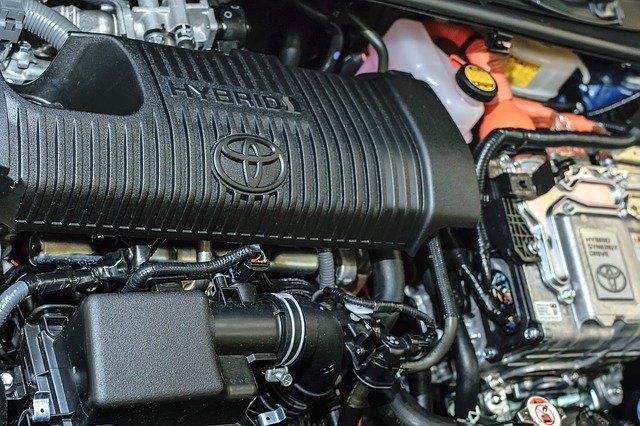
THE IMPORTANCE OF A COMPLETE MECHANICAL INSPECTION
We’ve all heard stories of someone’s used car breaking down in the middle of a busy highway or up in the mountains—don’t let that be you!
Whether you buy a used Toyota from an independent seller or a dealership, getting a complete mechanical inspection is key to protecting your investment and ensuring you’re safe on the road. That means more than just a 50-point checklist.
A qualified mechanic who specializes in Toyota repairs can identify and resolve any present issues and help you prepare for potential problems that may arise down the line. Once you know what to expect, you can budget for future maintenance and avoid any nasty surprises on the road.
Although you may be able to spot some common problems, such as rust or worn tires, it’s much more difficult to know what to look for when it comes to internal vehicle damage. For example, it’s common for the bushing rack in Toyota steering wheels to go bad, which means you need to replace the rack. This is tricky to spot—and even trickier to repair–on your own, especially if you don’t have much experience with Toyotas or cars in general.
An inspection can also help you take advantage of any time left on the vehicle’s warranty. Don’t wait until your warranty has run out to discover that you need new headlights or axle seals.
Your initial inspection is an opportunity to form a relationship with a mechanic you trust. Don’t wait until you’re desperate for assistance—do your vetting now, when you have the luxury of time.
Knowing where you can turn in an emergency offers precious peace of mind.
TYPES OF TOYOTAS
From compact hybrids to hefty trucks, there’s a Toyota model out there for everyone.
COMPACT
- Yaris
- Yaris iA
- Corolla
- Corolla iM
- Camry
- Avalon
- 86
MINIVAN
- Sienna
TRUCKS
- Tacoma
- Tundra
CROSSOVERS AND SUVS
- C-HR
- RAV4
- Highlander
- 4Runner
- Sequoia
- Land Cruiser
HYBRIDS AND FCV
- Camry Hybrid
- Avalon Hybrid
- RAV4 Hybrid
- Highlander Hybrid
- Prius
- Prius Prime
- Prius c
- Prius v
- Mirai
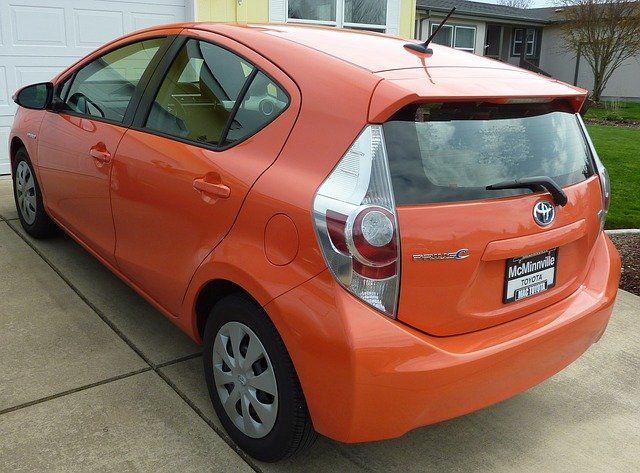
SELLING YOUR TOYOTA
If you’re ready to upgrade to a new model, you may wonder if you’re better off trading in your Toyota, or selling it and buying a new one.
TRADING IN
You can begin to process of trading in your vehicle on the Toyota website, using a Kelley Blue Book tool that allows you to describe both your current model and the model you want. Then:
- Receive your Instant Cash Offer (good for three days).
- Visit a participating dealership so they can assess your vehicle.
- Use your Instant Cash Offer to trade-in your car.
- Or let the dealership buy the car with cash.
SELLING ON YOUR OWN
If you plan on selling your car yourself, you’ll be happy to know that Toyotas hold their value well. In fact, Kelley Blue Book gave Toyota “three of the top five Best Resale Values for 2017,” making it their top non-luxury brand for overall resale value.
Especially if you’ve maintained or upgraded your vehicle, you’re likely to get a good offer.
To sell your Toyota:
- Head to a mechanic for a full inspection. Keep the receipt to prove your car’s current condition and up-to-date repairs.
- Make any large recommended repairs that greatly increase your car’s value, including:
- Patching or replacing tires
- Repairing or replacing brakes
- Replacing broken windows or mirrors
- Replacing burnt out light bulbs or broken lights
- Repairing air conditioning and heat
- Check your car’s current value using the Kelley Blue Book tool
- Decide where you will sell your vehicle
- Auto Forums—may be simple, but lacks protection
- Seller-secure websites—simple and safe (beware of fees!)
- Offline, among friends and other people you know. It’s always a good idea to create some paperwork, even if you are selling to family!
No matter where you sell, be sure to educate yourself about your car’s value and stand your ground if you receive an offer that’s too low.
BENEFITS OF DRIVING A TOYOTA
Colorado drivers need cars that can navigate Denver and Boulder traffic, survive tough winters, and deftly handle mountain passes and off-road adventures. And that makes Toyota a top choice.
Toyota makes safe, durable, reliable cars, trucks, and SUVs. They’ve racked up J.D. Power Dependability Ratings and Awards with models of all sizes, proving that they’re the vehicle manufacturer for outdoor and urban explorers alike.
They offer something for everyone, with more AWD and 4WD vehicles than any other brand. In addition to their outdoor vehicles and massive trucks, they make sustainable hybrids for any driver, marking them as a leader in automotive innovation.
Toyota also “ranks highest in the amount of American sourced and built cars and trucks,” surpassing even American brands.
These high-quality, high-powered vehicles are built to last, which means fewer headaches and great lasting value. Even a decade-old model is likely to serve you well for years to come, making Toyotas a great choice for anyone car shopping on a budget.
The only real drawback we can see? You might have a hard time picking out your Toyota from all the others in the parking lot!
LET YOUR TOYOTA TAKE YOU ANYWHERE
Proper maintenance and the services of a skilled mechanic can increase both the lifespan and resale value of your Toyota, saving you time, money, and frustration.
At Mountain Auto Repair, we don’t just know Toyotas—we drive them. We know you rely on your car, which is why you can rely on us.
If you’re interested in learning more about maintaining your Toyota, or other cars, trucks, and vans, we invite you to sign up for the Mountain Auto Repair Newsletter.
And, if you’re in Boulder, Denver, Niwot, Longmont, Lyons, or surrounding areas and need a reliable Toyota shop, we invite you to stop by or contact us.
Sources
Whether you are buying a new car or trying to extend the life of a classic, contact the maintenance experts at Mountain Auto Repair in North Boulder for fast, reliable service.
Along with oil, your Toyota needs a number of other important fluids to ensure it operates smoothly. You should keep an eye on:
Recent Articles
© 2021 Mountain Auto Repair
Website by Benveloper.com



